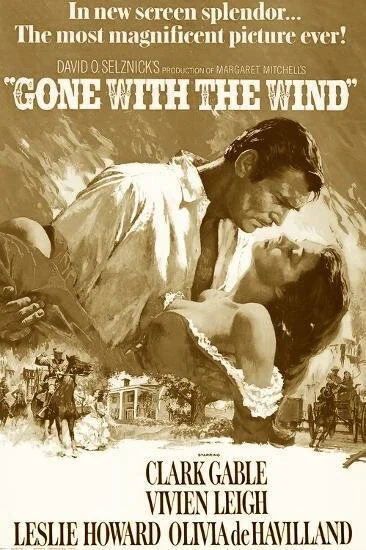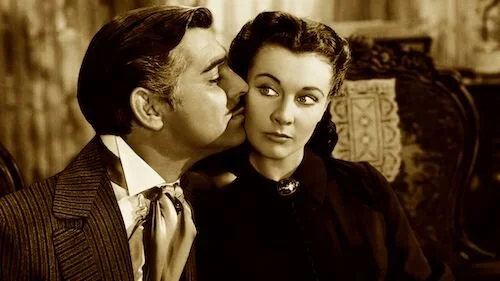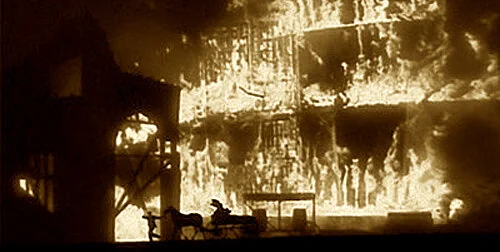Gone With the Wind
This review is a part of the Best Picture Project: a review of every single Academy Award winner for the Best Picture category. Gone With the Wind is the twelfth Best Picture winner at the 1939 Academy Awards.
I'm going to be straight with you. I have a strong love-hate relationship with Gone With the Wind. To me, it's the 1939 Titanic: a major technical achievement with a problem filled story. From afar, Gone with the Wind pulls off the exact goal Cavalcade wanted to achieve: feeling the shifting tides of historical events through the eyes of characters. Wind cleverly only attempts to relive a specific period of time: here, it's the civil war, and the reconstruction of the southern American states that followed suit.
What bothers me the most about this film isn't the focal point: two spouses that love each other, but never at the same time. Rhett Butler spends years (and four cinematic hours) trying to win over Scarlett O'Hara. That's fine. What really grinds my gears is how obsessed with Ashley Scarlett is. For a point of the film? Sure. A conflicted love interest can spice a story up. For four freaking hours? The entire film? It resorts Scarlett to a pining dreamer, and undermines how successful she is at whatever she does (because she is always seeking a response). When Rhett finally gives up, with the finest piece of cinematic salt to ever hit the screen ("Frankly, my dear, I don't give a damn."), you feel that line with all of its power. Part of its strength is finally not having to deal with Ashley being brought up ever second.
Gone With the Wind was the first fully colour film to win Best Picture, and it remains the longest winner to date (when including overture and intermission).
But that's when Scarlett finally turns around. Of course. Then the film ends. Not that I can try to suggest how a cinematic classic could be improved upon, but having a relationship rebuild while America restructures itself may have made sense for a film of this length. I also wouldn't recommend that the film is cut down, because it truly succeeds at what it is good at. I just hate seeing legend like Vivien Leigh directed to being a damsel in distress, fawning for a guy that is absent for much of the film. Especially in a film of this magnitude. Yeah, Titanic definitely rings a bell, with how such a large scale picture is dependent on trivial relationship pettiness.
The biggest selling point of this film is how advanced its filmmaking is. Even in 2019, the opening shots are rich with gorgeous colours. The fiery palette of the entire film evokes the raging passion of the lead characters (an instance where the feature-long romance plot works well with its historical backdrop). I don't even need to bring up the inferno sequence, with some of the craziest fire effects and production destruction ever put to film. When it comes to main priorities, the technicolor (even today: I can't imagine how 1939 cinema goers felt) and the technical wizardry still slays.
The sequence where Atlanta is burned to the ground remains a major achievement in cinematic production.
What elevates this film even more are the finer details: the biggest difference between Wind and Cavalcade. Wind becomes a testament to all of the problems of the early days of America that even the privileged citizens endured. These fill in the blanks between major events. This includes difficult subjects like miscarriages, era-relative illnesses, and the remnants of war. These are all the important dregs that Cavalcade completely avoided. Wind embraces them, and adds texture to a story that could have been easily bogged down by the Scarlett-Ashley story.
The love I have for this film outweighs the hate. Sure, some plot points haven't aged too well, especially politically (Blackkklansman already touched upon that better than I could), but a film of this magnitude definitely captures the intricacies of Margaret Mitchel's massive novel. Yeah, Gone With the Wind can dwell on pedestrian nonsense a little bit, but it also excels at a level of depth that wasn't quite seen during it's time. In ways, Gone With the Wind is problematic. Otherwise, it truly is a major game-changer in cinema in a number of ways. Even the naysayers (like me) have to give a damn about at least elements of it.
Andreas Babiolakis has a Masters degree in Film and Photography Preservation and Collections management from Ryerson University, as well as a Bachelors degree in Cinema Studies from York University. His favourite times of year are the Criterion Collection flash sales and the annual Toronto International Film Festival.






